Census & Elections
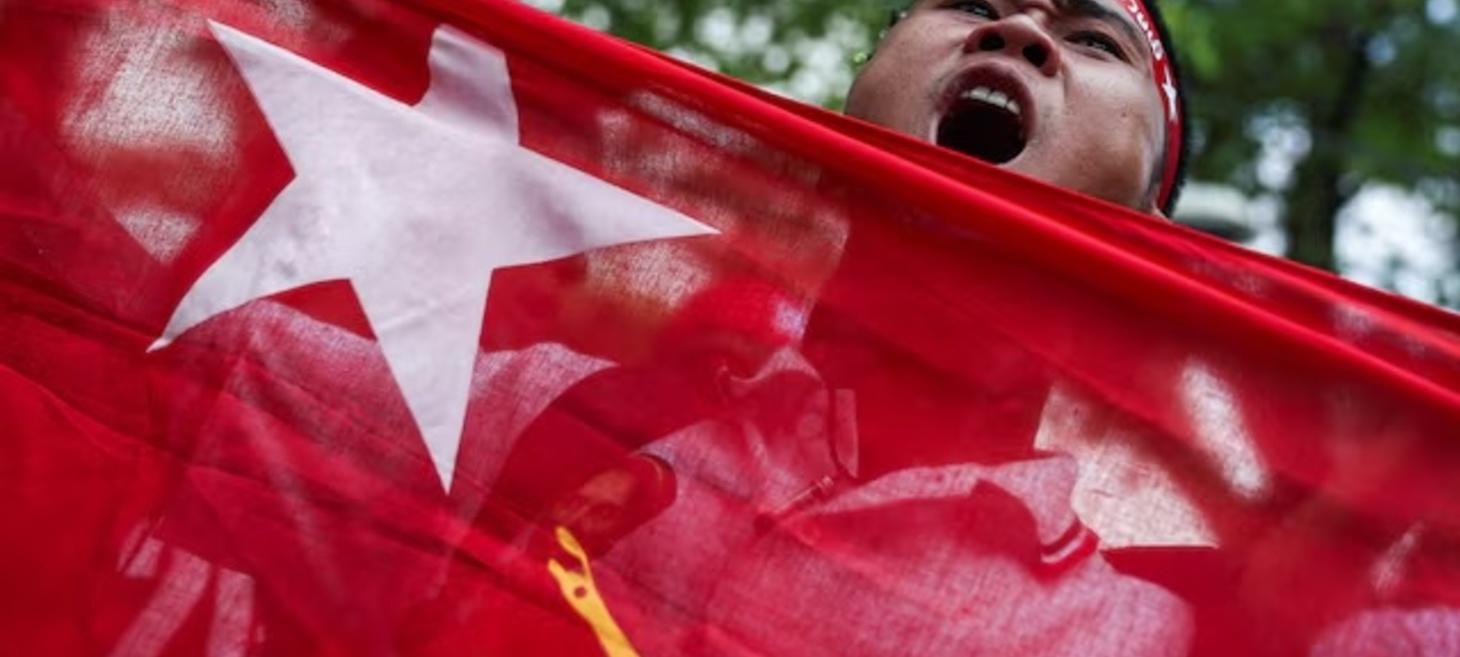
Risk of violence escalates in Myanmar's civil war as junta flags elections - Reuters
Myanmar's ruling junta is making efforts to hold an election in 2025, despite a civil war where the military has lost ground. The junta has outlined plans to neighbors, released census results to prepare voter lists, and announced efforts to ensure stability for the polls. However, the election is already criticized as a sham because voting will only occur in about half the country, dozens of opposition groups are banned, and only pro-military parties will participate. The junta was only able to conduct a full census in 145 of the 330 townships and plans to hold elections in only 160-170 townships. The National Unity Government (NUG), a shadow administration, has a 12-point plan to oppose the election, including not allowing the junta to hold elections in regions controlled by resistance forces. The upcoming election may escalate the conflict, with the potential for violence as opposition forces may attack polling stations, election officials, and party candidates. Additionally, the junta's plan to hold an election has been discouraged by ASEAN, who urged the junta to instead start dialogue and end hostilities immediately.
Conflict
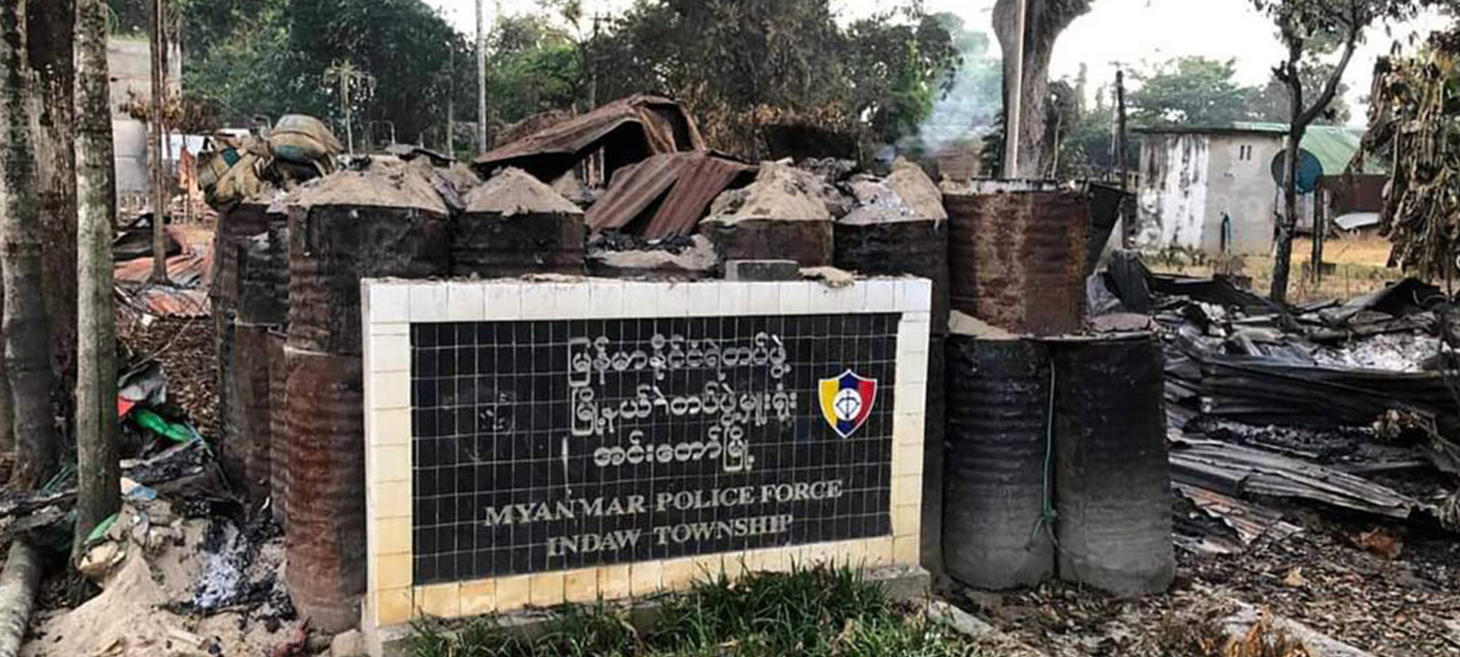
Myanmar Resistance Forces Resume Assault on Junta Holdouts in Indaw
Fighting has resumed in Indaw town in northern Sagaing Region after a nearly three-month halt, with People’s Defense Force groups (PDFs) launching an offensive against the junta's last position. The resistance forces, including the KIA, the All Burma Students’ Democratic Front, and local groups, had previously seized the police station and General Administration Department office in Indaw in August, before being forced to stop their assault when the junta took civilian hostages. Junta forces retreated to a WWII-era underground hospital and monastery, trapping around 800 civilians who were then used as human shields. Fighting resumed briefly in early November, allowing around 200 residents to flee. The most recent fighting has been described as fierce, with continuous artillery shelling and airstrikes. Hundreds of civilians remain trapped at the monastery, and the town is reportedly deserted and almost completely flattened due to previous clashes.
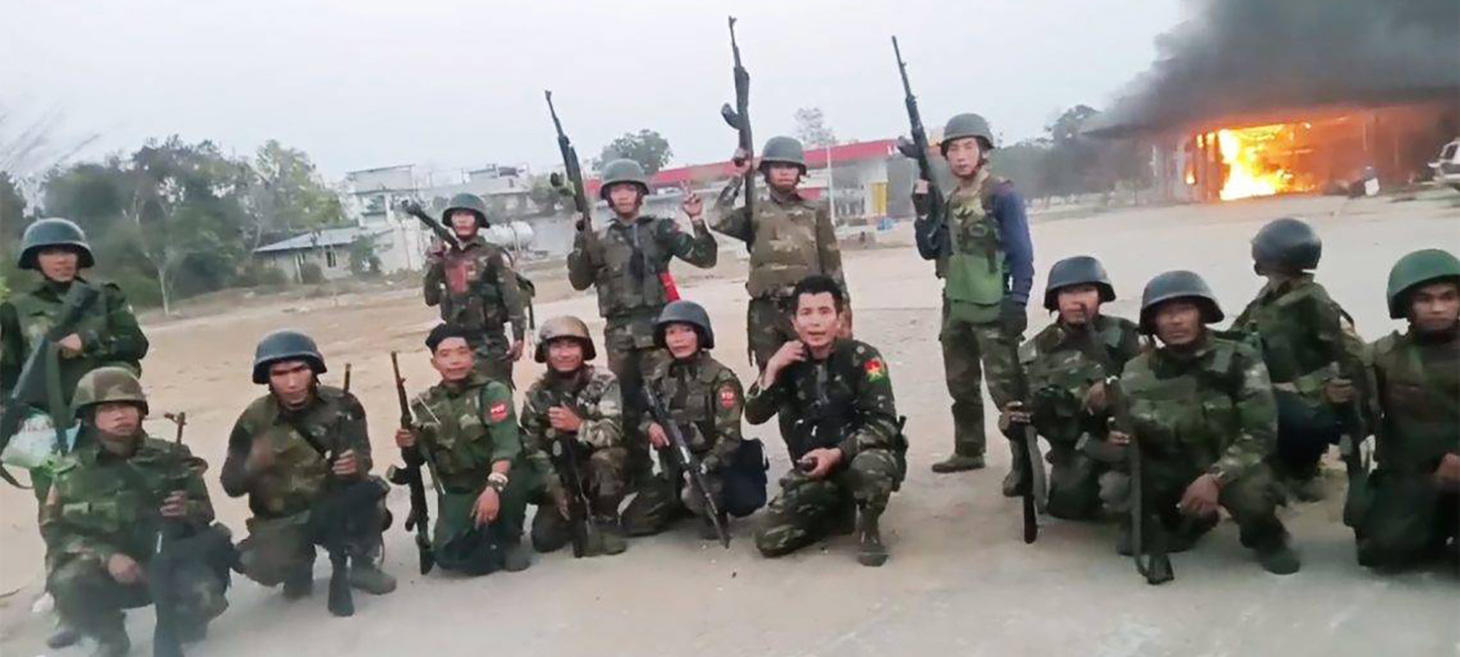
KIA, Allies Seize Airport, Armored Unit From Myanmar Junta in Bhamo
The Kachin Independence Army (KIA) and allied resistance forces have seized the airport and an armored battalion base in Bhamo, Myanmar. The KIA captured the Armored Battalion 7006 base, along with seven armored vehicles, on Saturday and the Bhamo Airport on Sunday. They are also surrounding the regime’s Artillery Battalion 366 and Military Operations Command 21. Clashes in Bhamo are escalating, with the junta conducting near round-the-clock air and artillery strikes. Additionally, the KIA and its allies have seized an estate housing a military intelligence unit in Bhamo. Most Bhamo residents have fled into rural areas, leaving the town largely deserted. The KIA and its allies have captured over 300 junta outposts and bases in Kachin State, occupying around 15 towns and a former rare-earth mining hub, as well as two towns in northern Shan State.
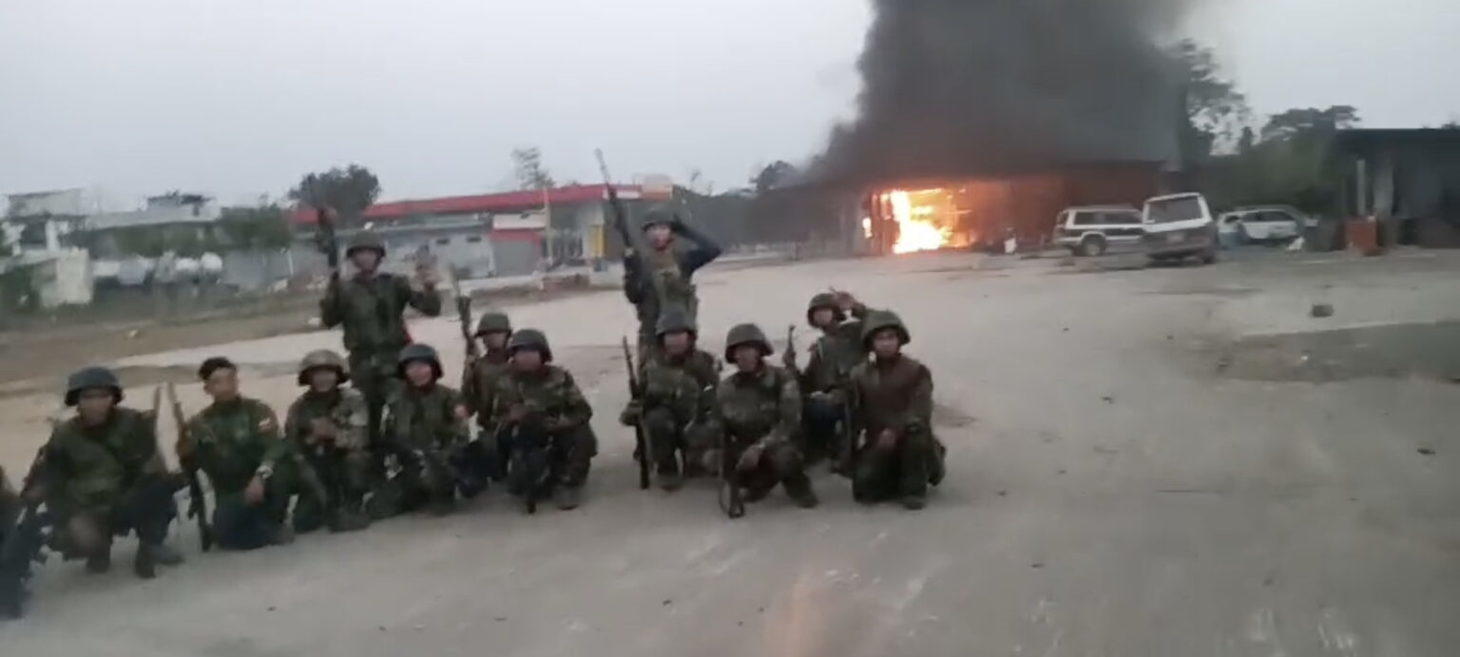
Anti-junta fighters capture air, artillery bases in Kachin State
The Kachin Independence Army (KIA) and its allies have captured two artillery battalion bases and an airfield in Bhamo Township, Kachin State. The offensive began in December and intensified in late January. The KIA-led forces took control of the junta's Artillery Battalion (AB) 366 and AB 6007 bases on January 26 after two days of fighting. The anti-junta fighters are still attacking the army’s Military Operations Command (MOC) 21 headquarters near the Bhamo airfield. The KIA's recent actions are part of a larger pattern of increasing conflict in Myanmar.
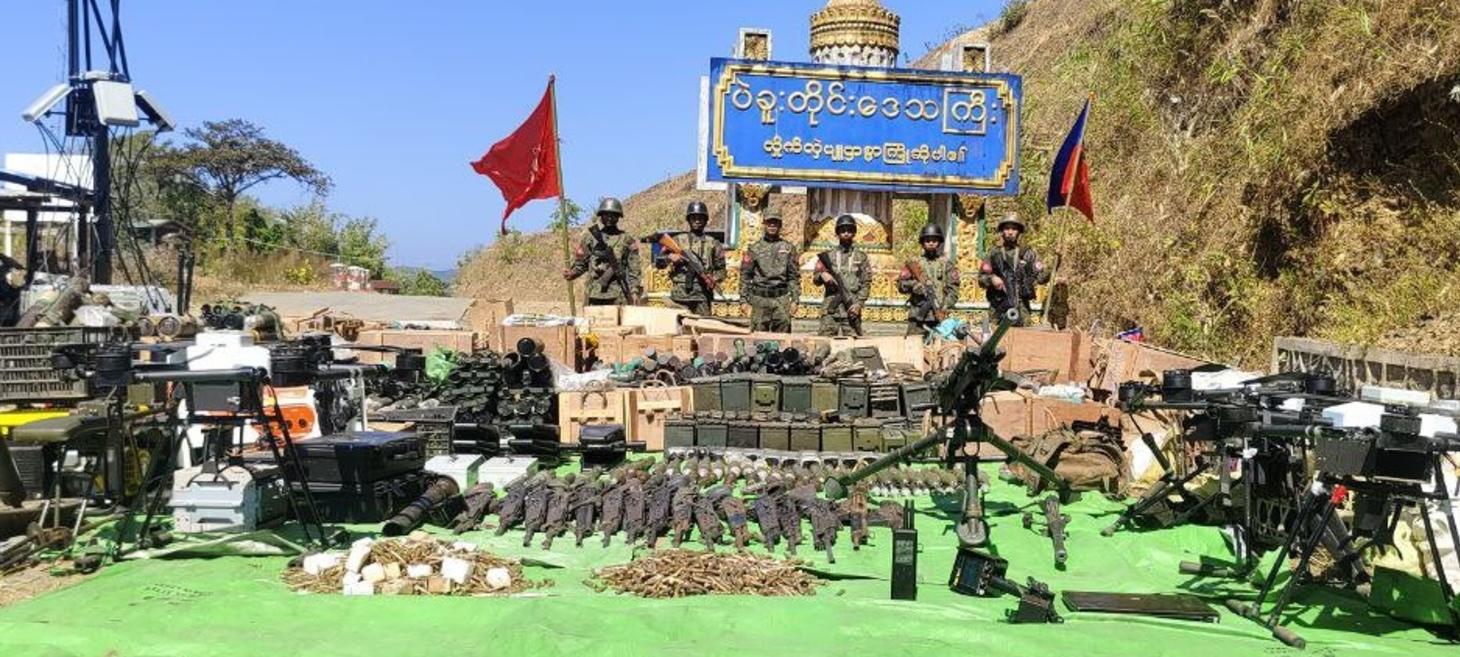
Arakan Army intensifies border offensives in strategic push
The Arakan Army (AA) is expanding its operations beyond Rakhine State, intensifying attacks on junta bases in the neighboring Ayeyarwady, Bago, and Magway regions. The AA is launching offensives on remaining junta bases in Rakhine State, with clashes occurring along the Magway-Rakhine and Bago-Rakhine borders, as well as in areas of the Ayeyarwady Region. The AA has seized weapons, drones, and drone jamming devices during these clashes. They have also captured the coastal village of Baw Mi in the Ayeyarwady Region, though fighting persists. In Magway Region, the AA attacked a joint military column, pursuing retreating junta forces and seizing weapons. The AA now controls 14 out of 17 townships in Rakhine State, with the junta holding only Sittwe, Manaung Island, and Kyaukphyu. The AA has surrounded junta forces in Kyaukphyu up to the Kyauk Talone Pagoda, with only the Dhanyawadi Naval Base remaining under junta control. The AA is open to dialogue with the military regime while continuing to take ground in Rakhine State and other regions.
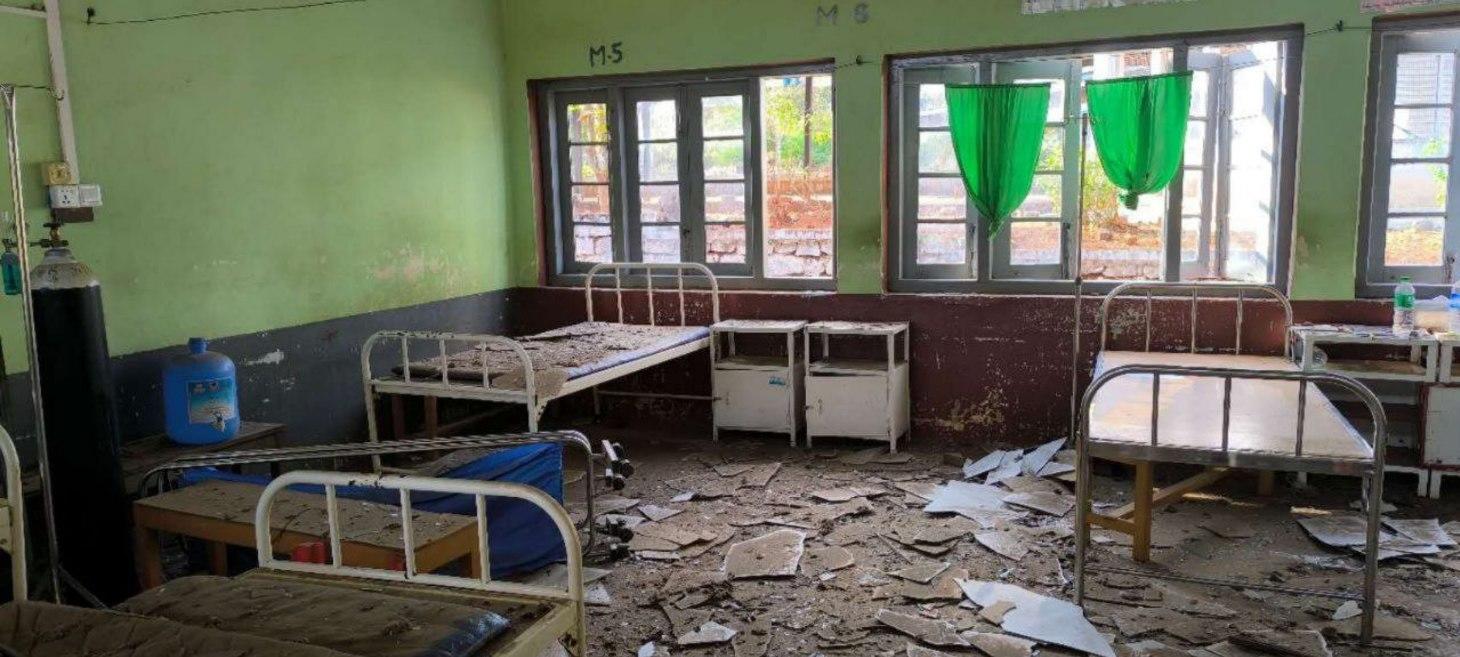
Myanmar junta airstrikes on school and hospital leave dozens dead, injured
Over the weekend, airstrikes by the Myanmar junta resulted in the deaths of at least 22 people and injuries to dozens more. The attacks targeted a school and a hospital in areas held by resistance forces. In Mandalay Region’s Myingyan Township, an attack on the village of Singut resulted in the deaths of 12 resistance fighters and six civilians, including three children, one of whom was a five-month-old infant. A junta fighter jet dropped two bombs on the school in Singut, which was also hit by multiple rounds of gunfire from a combat helicopter. In a separate incident, a hospital in Kyaukme was also attacked.
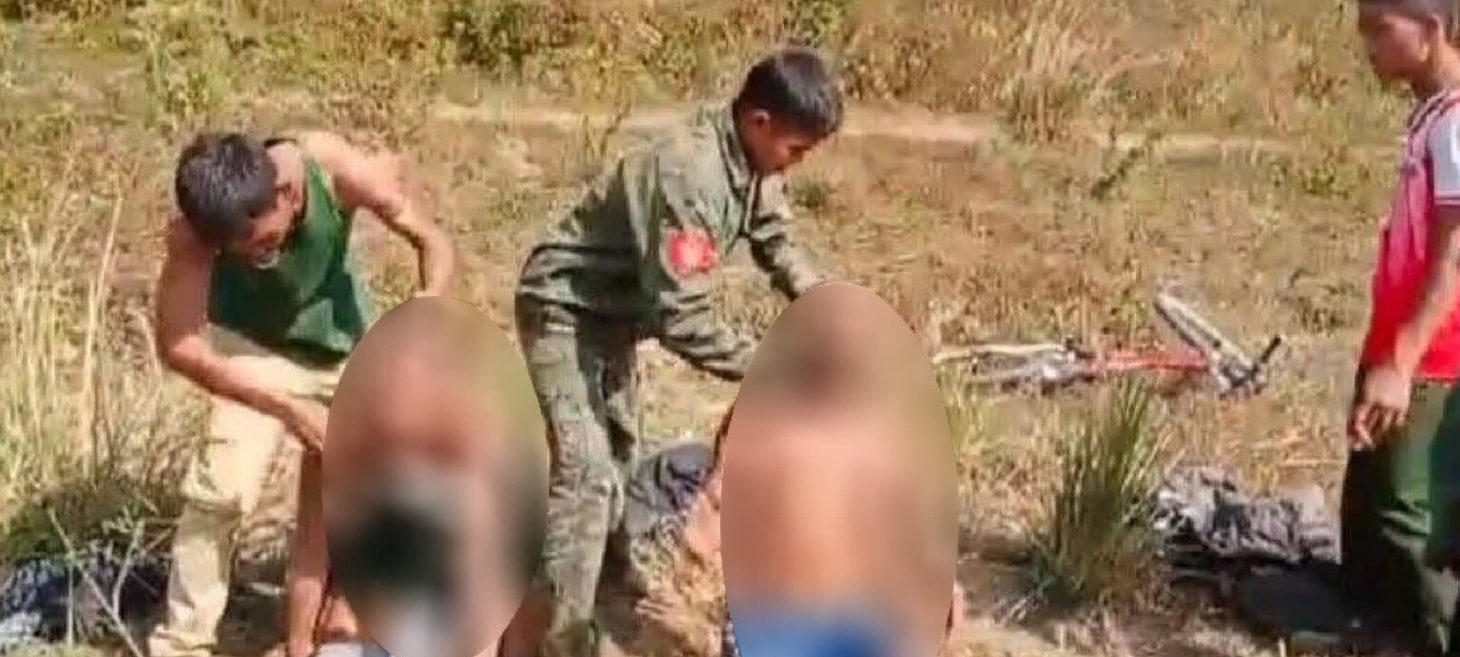
Arakan Army executes prisoners of war, human rights groups demand accountability
The Arakan Army (AA) has admitted that its troops were responsible for the execution of prisoners of war, which was captured in a video that surfaced online. The video, which began circulating on December 25, shows men in AA uniforms cutting the throats of captives next to a shallow pit. According to the AA spokesperson, the soldiers involved have been disciplined for what they described as "an act of revenge". The captors are heard in the video taunting the prisoners and asking them about killing Rakhine people. This incident has led human rights groups to demand accountability. The executions occurred amid ongoing conflict between the AA and the Myanmar junta, with the AA also intensifying border offensives.
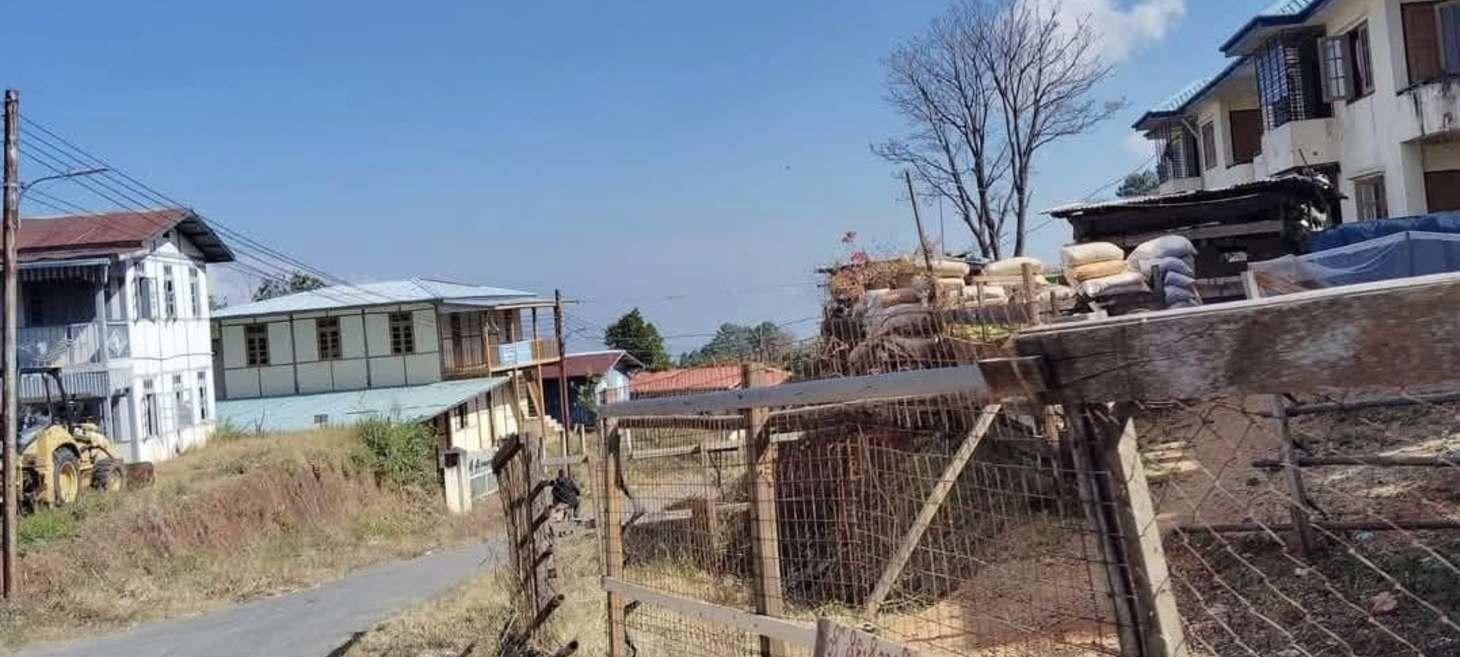
80% of Mines Cleared from Mindat Town, Chin State
The Mindat Chinland Defence Force (CDF) took control of Mindat Town on November 22, 2024, and since then, 80% of the landmines in the town have been cleared. According to Ko Yaw Man, a spokesperson for Mindat CDF, the remaining 20% of landmines are mostly located near former junta bases and will take time to clear. In addition to demining efforts, Mindat CDF is working to restore the water supply, provide rabies vaccinations for stray dogs, and plan for the safe return of displaced people. The Mindat CDF also aims to establish law and order, enhance livelihoods, and gradually roll out public services. They will extend their administration system from rural areas into Mindat Town, with possible additional departments such as Municipality and Construction. There have been two landmine incidents since the Mindat CDF takeover, resulting in injuries but no fatalities or permanent disabilities.
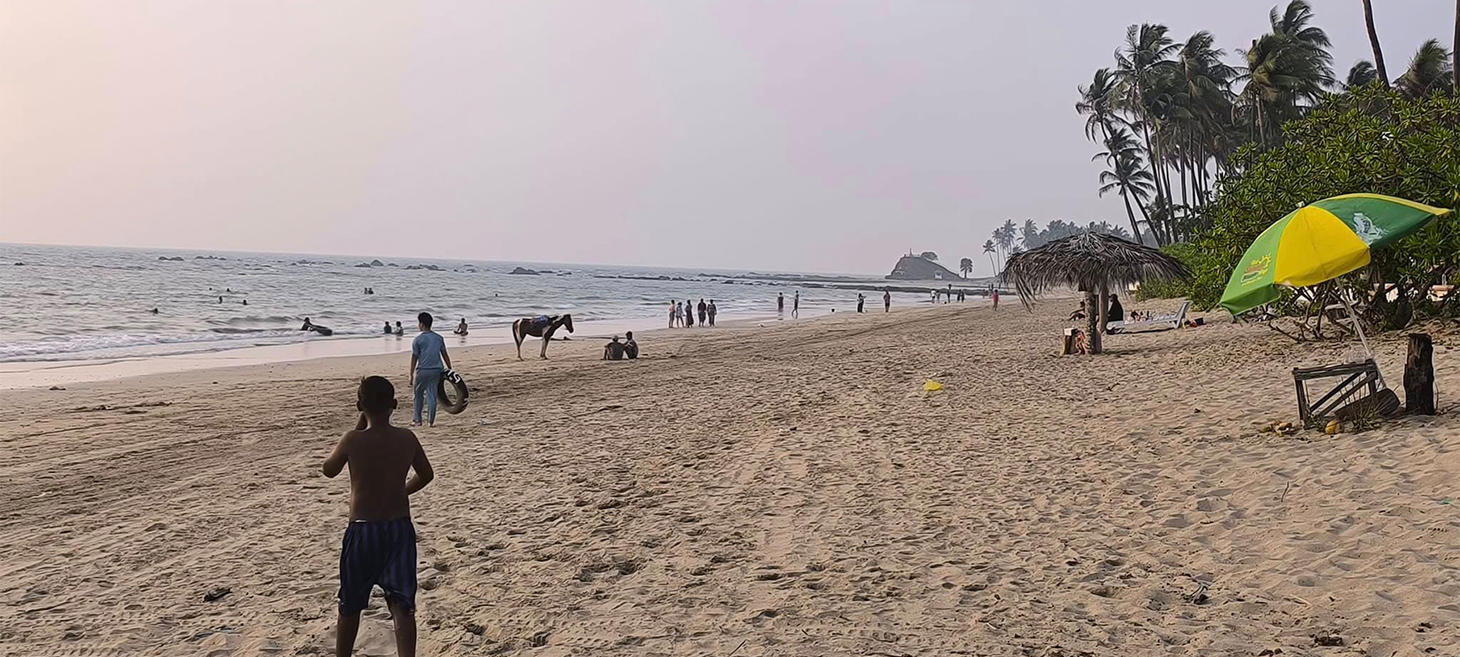
Popular Beach Resort Deserted as Fighting Spills Over Into Ayeyarwady
The popular Chaungtha Beach in Myanmar is now largely deserted as fighting between the regime and the Arakan Army (AA) has spilled over from neighboring Rakhine State into the Ayeyarwady Region. Hotels, shops, and KTVs have closed, and many locals have fled. Although the beach used to be a popular destination for domestic travelers, and direct flights were launched to attract Russian tourists, all hotel bookings have now been canceled. Fighting has come as close as 48 km away, causing locals to flee. While many hotels are preparing to close, some remain open with reduced staff and are no longer taking new bookings. However, Ngwesaung beach, down the coast from Chaungtha, is still operating with visitors, although some bookings have been cancelled. The AA has captured some junta positions on the Ayeyarwady-Rakhine border, and while they initially advanced on Ayeyarwady, they now appear to be moving east towards the Irrawaddy River rather than further south down the coast.
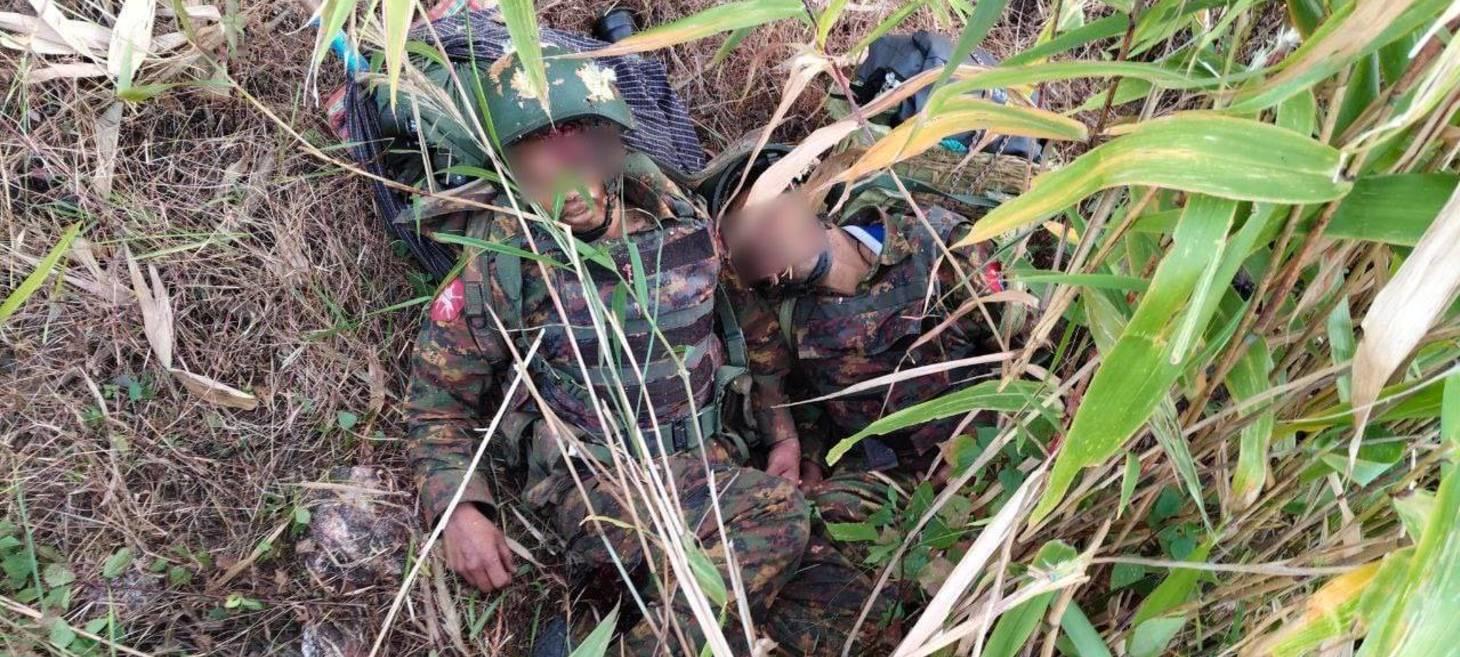
Anti-junta groups ambush, attack Myanmar military forces near Rakhine-Magway border
Anti-junta fighters, specifically the People Revolution Army of Magway (PRA-Magway), have been actively ambushing Myanmar military forces near the border of Rakhine and Magway regions. These groups are targeting convoys carrying reinforcements and supplies, as they lack the capacity for large-scale offensives. In one incident, resistance fighters killed at least five junta soldiers after intercepting a convoy of four vehicles. The fighting has been fierce since the beginning of January, particularly on the major route connecting Ann, Rakhine State, with towns in Magway Region. Additionally, an outpost near Ka Myin Kan, Ann Township, fell to the Arakan Army (AA). These actions are part of a broader pattern of intensified border offensives by the Arakan Army.
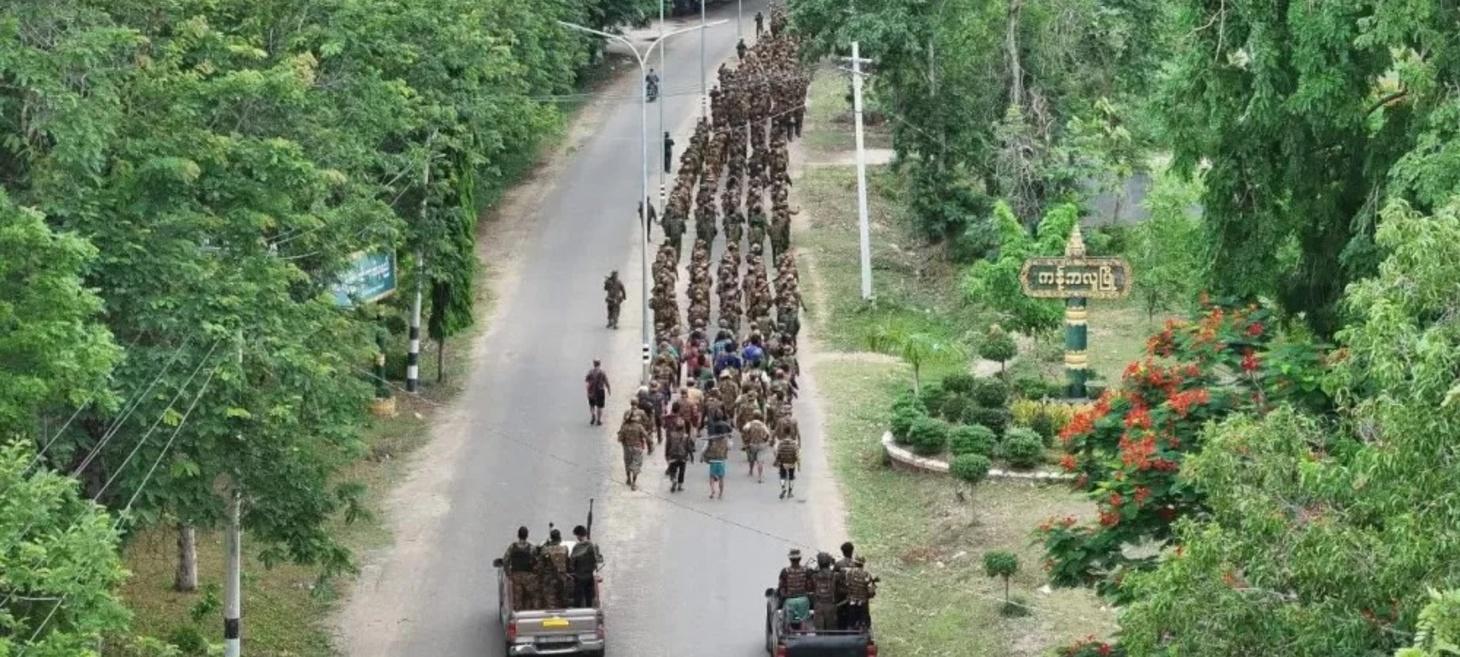
Why the name Pyusawhti is sowing fear in central Myanmar
The Pyusawhti is a pro-junta militia in Myanmar that has been sowing fear in the central part of the country. The group's name is derived from a mythical warrior prince, and it was first revived in the 1950s as a defense scheme before being disbanded. It reappeared more than 60 years later, under coup leader Min Aung Hlaing. The Pyusawhti is made up of loosely controlled groups rooted in communities in Myanmar’s heartland and is supported by the military. The military uses these groups to commit violence without being directly identified and to gain local knowledge that soldiers lack. These groups force residents to join their ranks and are known to spy on opponents of the coup, block access to villages, extort money, and burn down houses. The Pyusawhti's actions have fractured communities and created a climate of fear, leading thousands of residents to flee their homes. The lack of accountability for their actions is striking.
Conscription
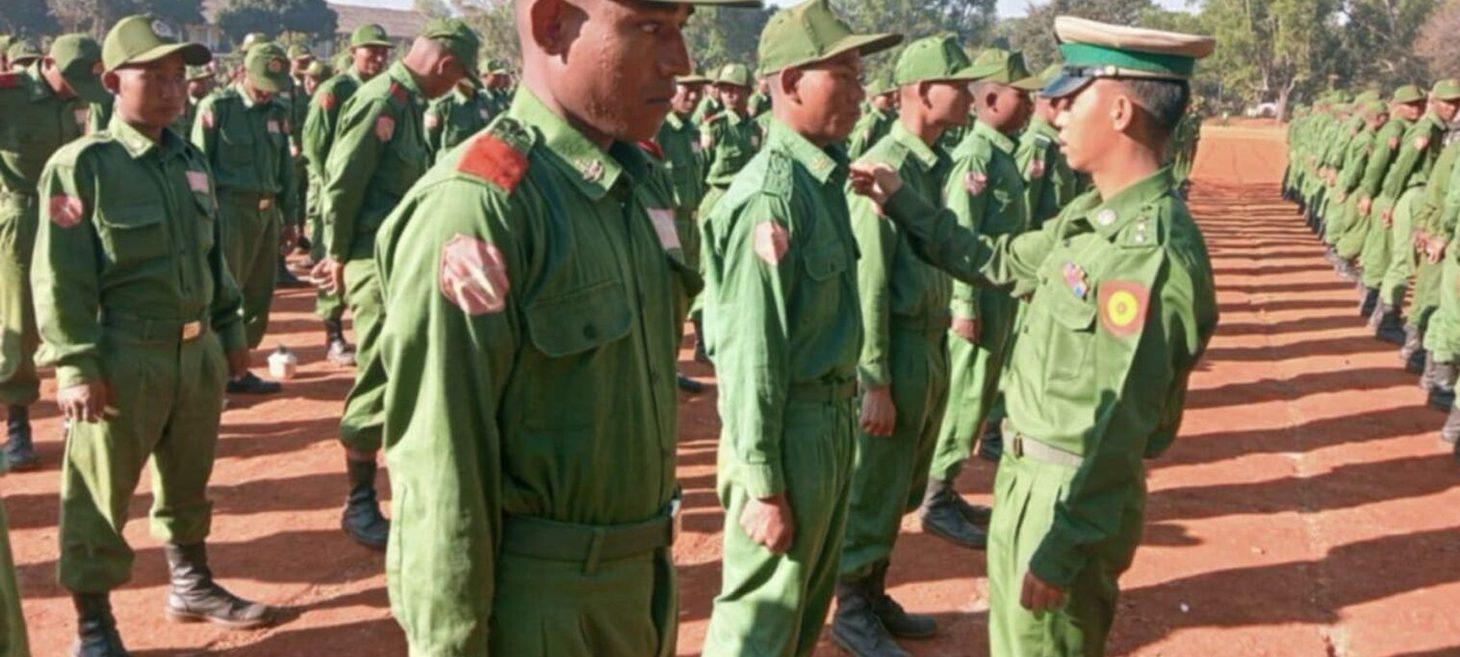
Myanmar junta enacts foreign travel ban for people of conscription age
Myanmar's military council has amended the country's conscription law, prohibiting those eligible for military service from traveling abroad without permission. New bylaws authorize local administrators to create lists of residents within the military service age range and require them to undergo medical examinations. Those who pass the medical exams will be registered for military service and must wait for a summons, and they are not permitted to leave Myanmar during this waiting period. The junta has stated that approximately 14 million people are eligible for military service. The new laws are not public, but Myanmar Now was able to access the classified text.
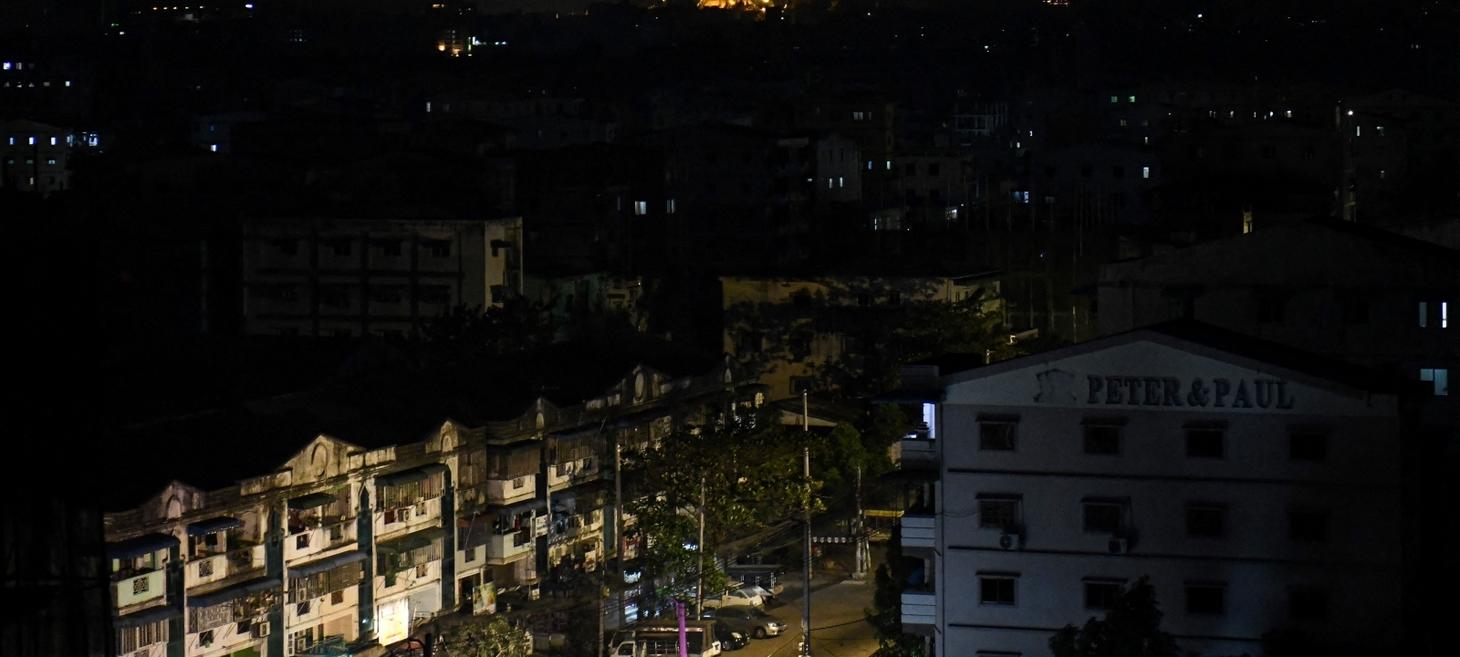
Junta dragnet: More youth abducted in desperate conscription drive
In Myanmar, the junta is abducting young men to meet military conscription targets, often using illegal measures outside of the formal conscription process. These abductions occur during household inspections for unregistered guests, a practice common since the 2021 coup. Families report that bribes, previously a method of freeing conscripted relatives, are no longer effective, suggesting increasing pressure on authorities to meet recruitment goals. The conscription law, enacted in 2010 but only recently enforced, states that men aged 18-35 and women aged 18-27 can be called to serve, but the regime is currently focusing on men, and it is estimated that there are approximately 14 million potential recruits. Many young people are trying to avoid conscription by fleeing the country or joining armed resistance groups. However, for some families, leaving is not an option due to financial constraints, and people are resorting to measures such as avoiding going out at night, or sleeping at home. There are also reports of irregularities, such as the conscription of underage youth or those who should be exempt, and the junta's central conscription committee has not taken any action to address these issues.
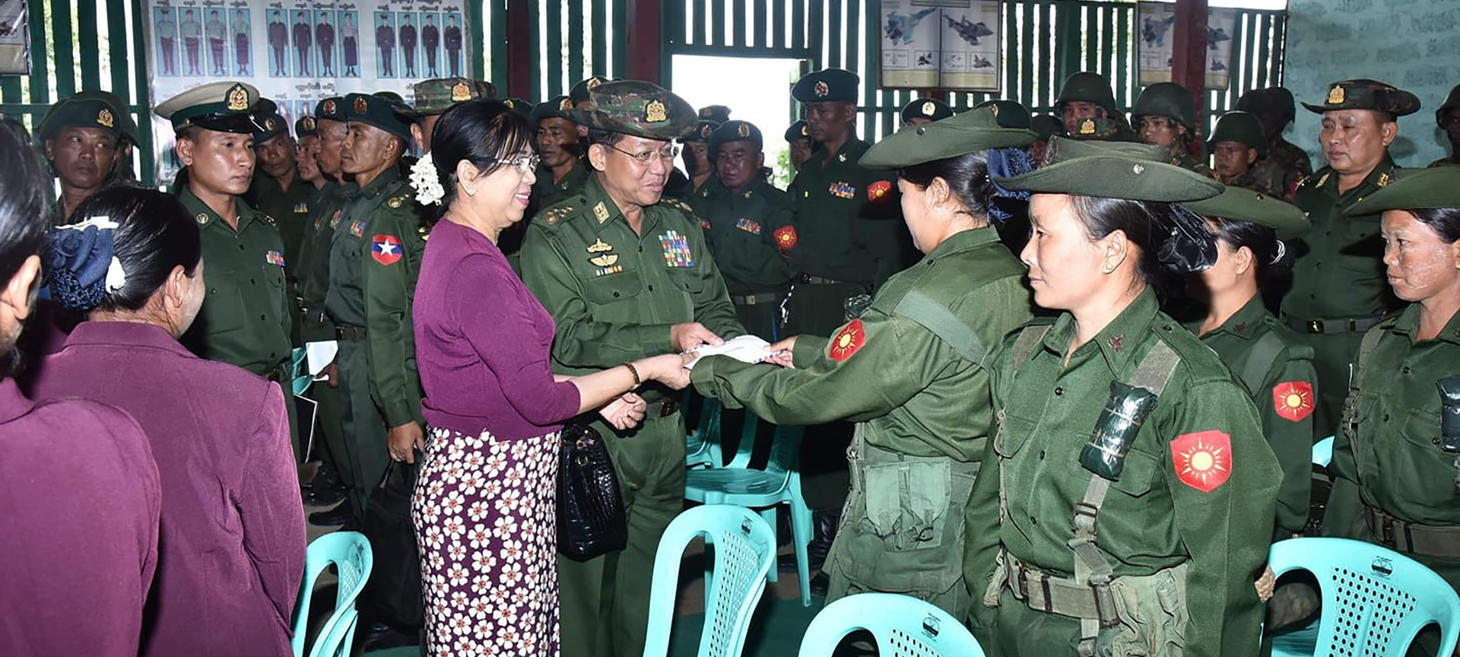
Myanmar Junta Registering Women Ahead of Possible Conscription
The Myanmar junta has begun registering women for military service, a move that follows the reactivation of the Conscription Law last February, which requires men aged 18-35 and single women aged 18-27 to serve in the military for a minimum of two years. The regime started compiling lists of eligible women in Yangon in mid-January, including in industrial areas like Hlaing Tharyar Township. This action is occurring amidst severe troop shortages for the junta. The updated Conscription Law now mandates that family members serve consecutively and restricts those eligible from leaving the country without permission. Failure to respond to a call-up requires a family to explain the absence and register a substitute, with draft dodgers facing up to three years in prison. While a junta official has stated that they are only compiling lists and have no plans for female recruitment, the regime previously said it would draft women in the fifth batch of conscripts.
Crime & Narcotics
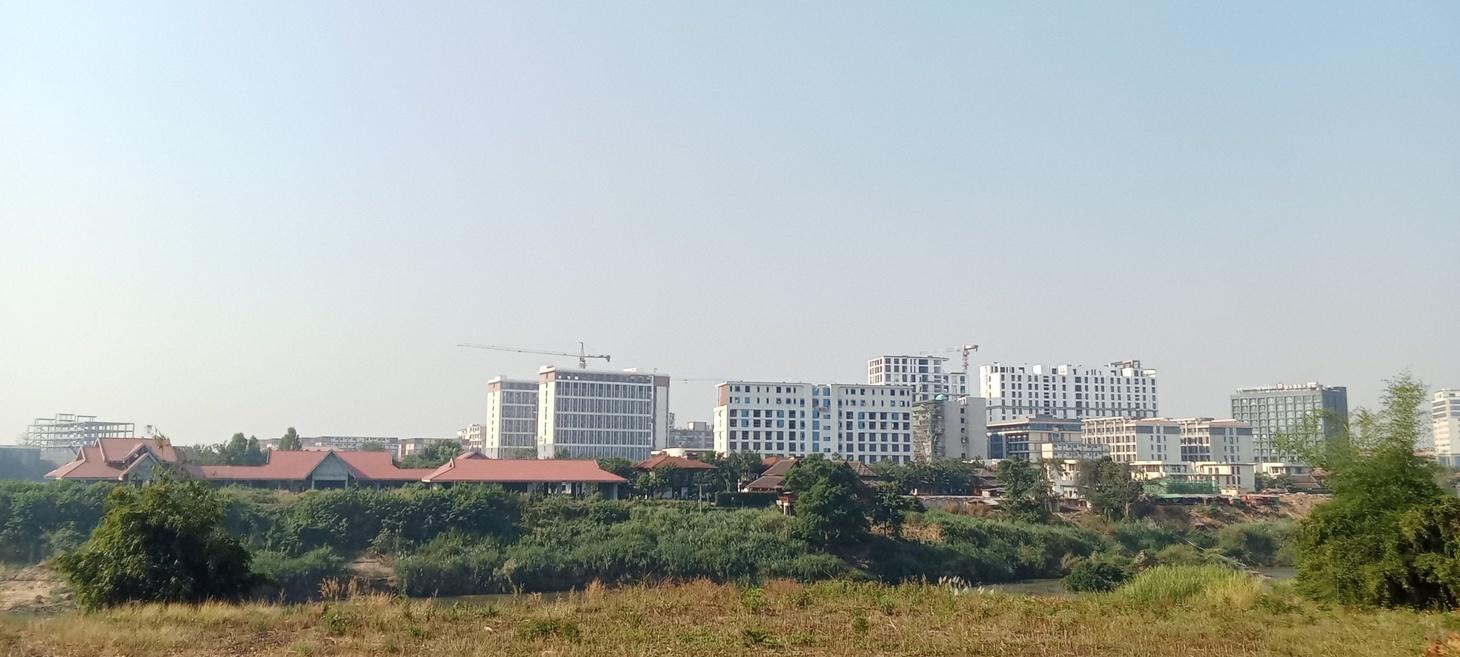
Shwe Kokko: How governance failures and political quagmire created Myanmar’s most notorious crime hub
The Shwe Kokko New City Project in Myanmar's Karen State has become a hub for transnational crime due to a complex interplay of factors, including corrupt politics, competing security interests, and fractured governance. Initially approved under the National League for Democracy administration, the project's execution became entangled with the regime-sponsored Karen Border Guard Force (BGF), a paramilitary group that wields significant control in the area. The BGF is deeply involved in the controversies surrounding the project. Following the 2021 military coup, the central government's control weakened, allowing the BGF to assume a de facto governing role in the region. Despite the ongoing civil conflict in Myanmar, the military regime has conspicuously spared Shwe Kokko from airstrikes, which suggests a level of protection for the illicit activities occurring there, such as illegal gambling, financial scams, and human trafficking. The project has been criticized by local communities and Karen resistance groups due to its ties to international crime syndicates and its negative social, environmental, and political impacts. The situation is exacerbated by the lack of international attention to Myanmar's civil war, which has allowed the military regime to ignore its obligations to regulate the border region.
Economy
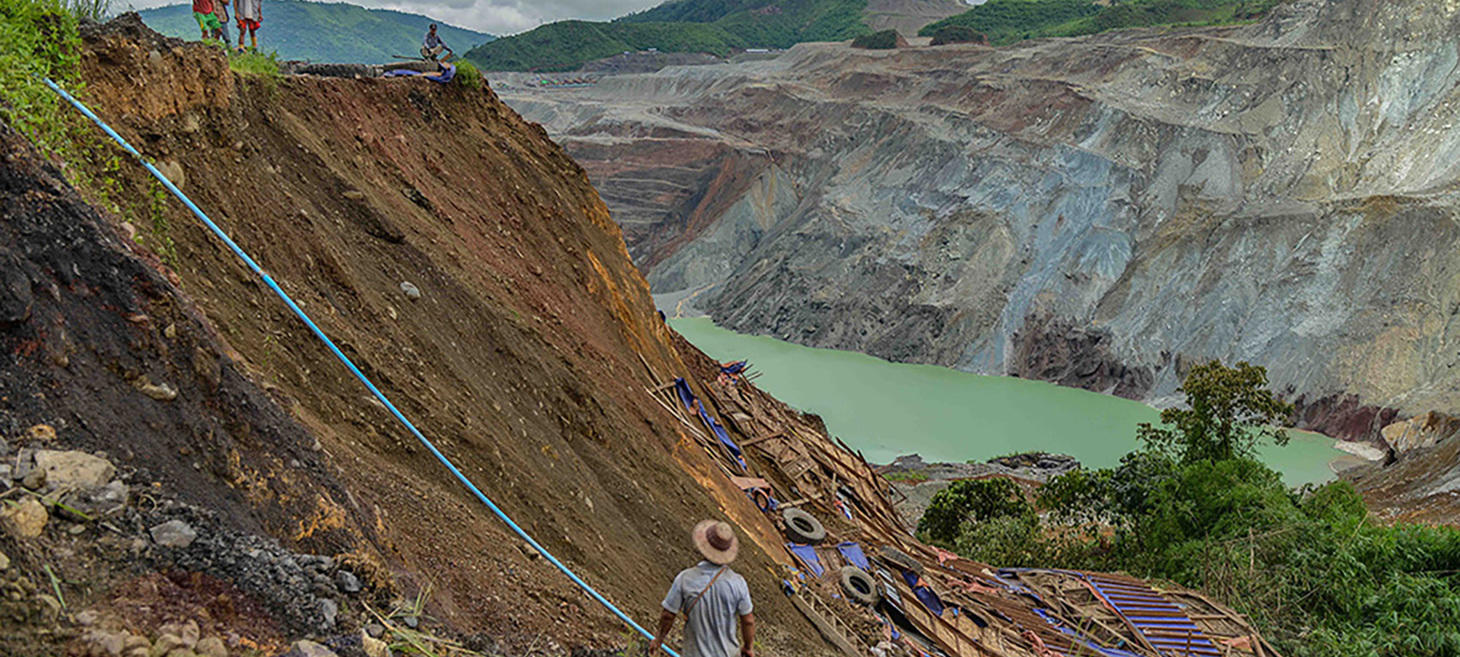
Plundering Paradise: China’s Role in Myanmar’s Environmental Crisis
Myanmar's natural resources, including jade, timber, oil, gas, and hydropower, have been exploited by foreign entities for years, with China becoming the most aggressive player. Chinese resource extraction has caused severe environmental damage and displacement of local populations. Illegal logging, driven by Chinese demand for teak and hardwoods, has led to a significant loss of forest cover. Mining, particularly for jade and rare earth minerals, has resulted in ecological disasters, polluted waterways, and health issues for local communities. China's involvement in hydropower projects, such as the Myitsone Dam, has also sparked controversy due to environmental and social impacts. Additionally, China's Belt and Road Initiative projects in Myanmar, like the Kyaukphyu deep-sea port, have raised concerns about debt dependency and the erosion of Myanmar's sovereignty.
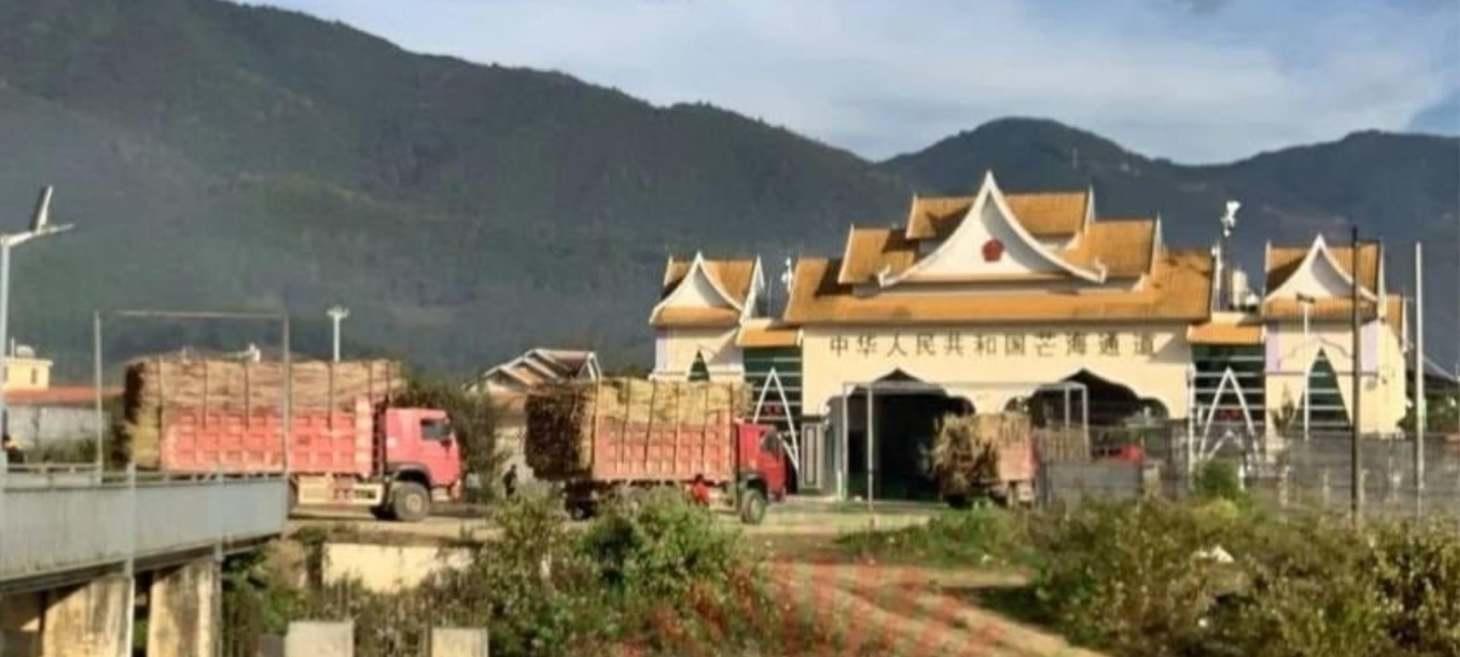
China Reopens Border crossings to MNDAA-Controlled Areas
Following a ceasefire agreement between the Myanmar junta and the Myanmar National Democratic Alliance Army (MNDAA) brokered by China in Kunming on January 18, 2025, China reopened its border crossings to MNDAA-controlled areas on January 20, 2025, after a seven-month closure. The border crossings had been closed since the end of June 2024, after the Three Brotherhood Alliance, of which the MNDAA is a member, launched the second phase of its Operation 1027 offensive. Although the border posts have reopened, only people from China are allowed to cross into MNDAA-controlled areas, not the other way around. The border crossing between Pang Hsai (Kyu Koke) Town and Wanding Town in China has reopened for an initial period of one month. Only food and supplies that a person can carry by hand are permitted to cross, and the MNDAA is keeping a record of those entering but not yet stamping documents. In addition, not all goods are allowed to cross from China into MNDAA controlled areas, only kitchenware, fruits, vegetables, and certain food items are permitted. Fuel imports from China through the border crossing from Manhkar in China to the UWSA-controlled town of Namtit also resumed on January 20, 2025.
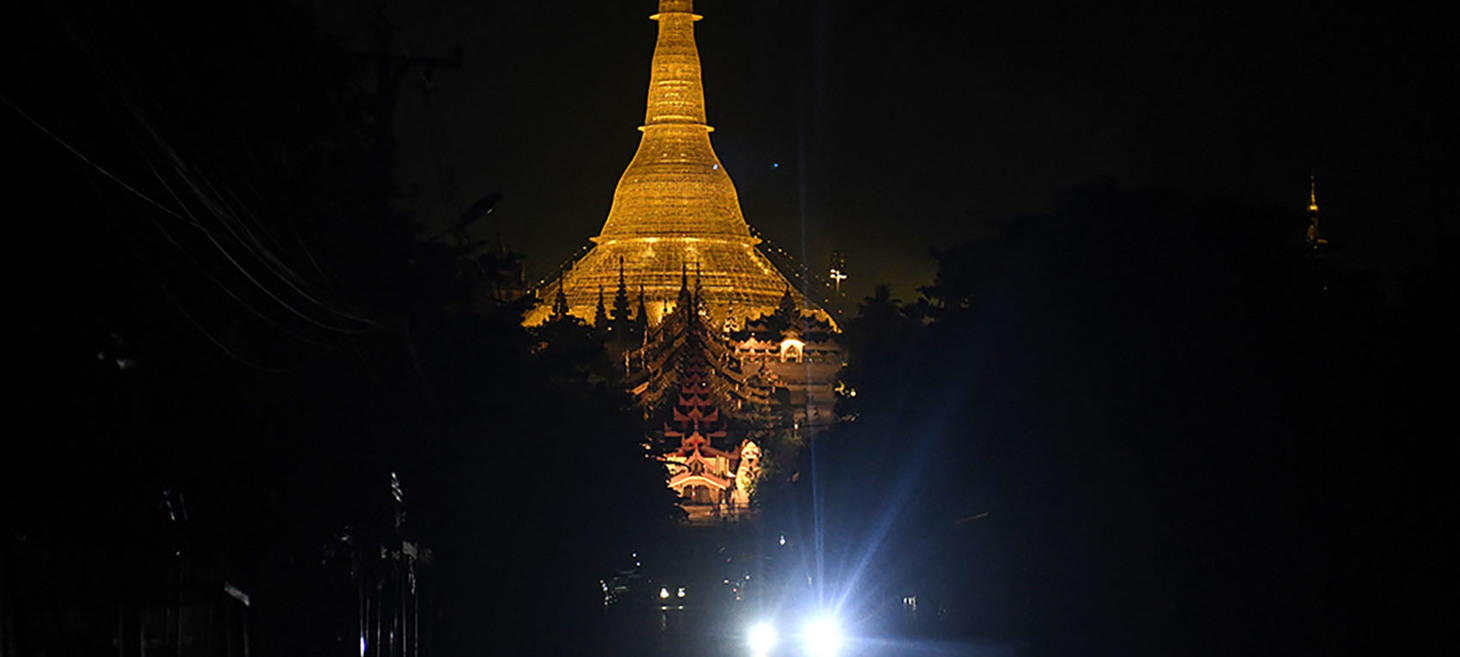
Life Without Power Spells Daily Misery for Yangon’s Residents
In Yangon, Myanmar, residents are experiencing chronic power outages that have become the "New Normal," with increased frequency since January. These blackouts impact daily life, making it difficult to perform tasks that require electricity, such as cooking, pumping water, and charging electronic devices. Water access is also limited due to power outages, creating a "double trouble" situation for residents. While some apartments have wells and groundwater pumps, this is not a universal solution. The lack of electricity also makes it hard to cope with the heat, especially in densely populated urban areas where fans and air conditioning are needed. Myanmar's electricity infrastructure has struggled for decades, and a coup interrupted plans to increase electrification. Currently, power is provided on a rotating basis, but residents often receive less than the allocated time. The junta has blamed resistance groups for the power shortage, while the World Bank cites structural issues, political instability, and conflict as major factors. The power crisis is compounded by rising temperatures, making the situation even more difficult for Yangon residents.
Ethnic Issues
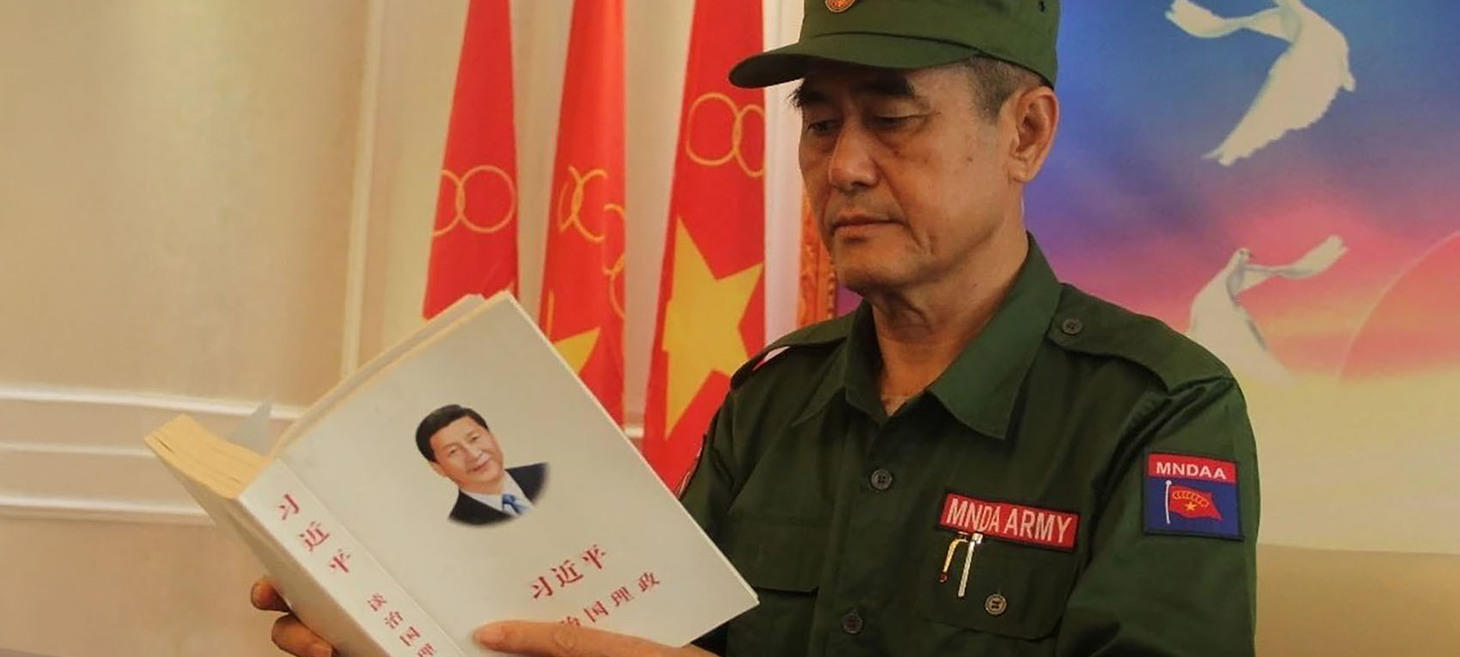
MNDAA Leader Vows to Uphold China’s ‘Peace’ Policy on Myanmar
Following a China-brokered ceasefire agreement between the Myanmar National Democratic Alliance Army (MNDAA) and the military junta, MNDAA leader Peng Daxun pledged to uphold China's policy of "promoting peace and dialogue" in Myanmar. Peng stated that the MNDAA would safeguard its political rights and autonomy while striving for peace in its controlled territory. The MNDAA, part of the Brotherhood Alliance, has close ties to China, which has been pressuring anti-regime ethnic armed groups to make peace with the junta to protect its interests, especially related to the Belt and Road Initiative. After the MNDAA seized Lashio, China pressured the group into a ceasefire, including placing Peng under house arrest. In his first public statement since leaving house arrest, Peng emphasized the importance of the ceasefire and committed to ensuring stability along the China-Myanmar border, avoiding any mention of the Myanmar military or offensive plans, focusing instead on economic development and governance. The MNDAA also plans to combat illegal industries and attract major projects under China’s BRI. The MNDAA's shift in focus is possibly due to pressure from China and the United Wa State Army.
Foreign Affairs
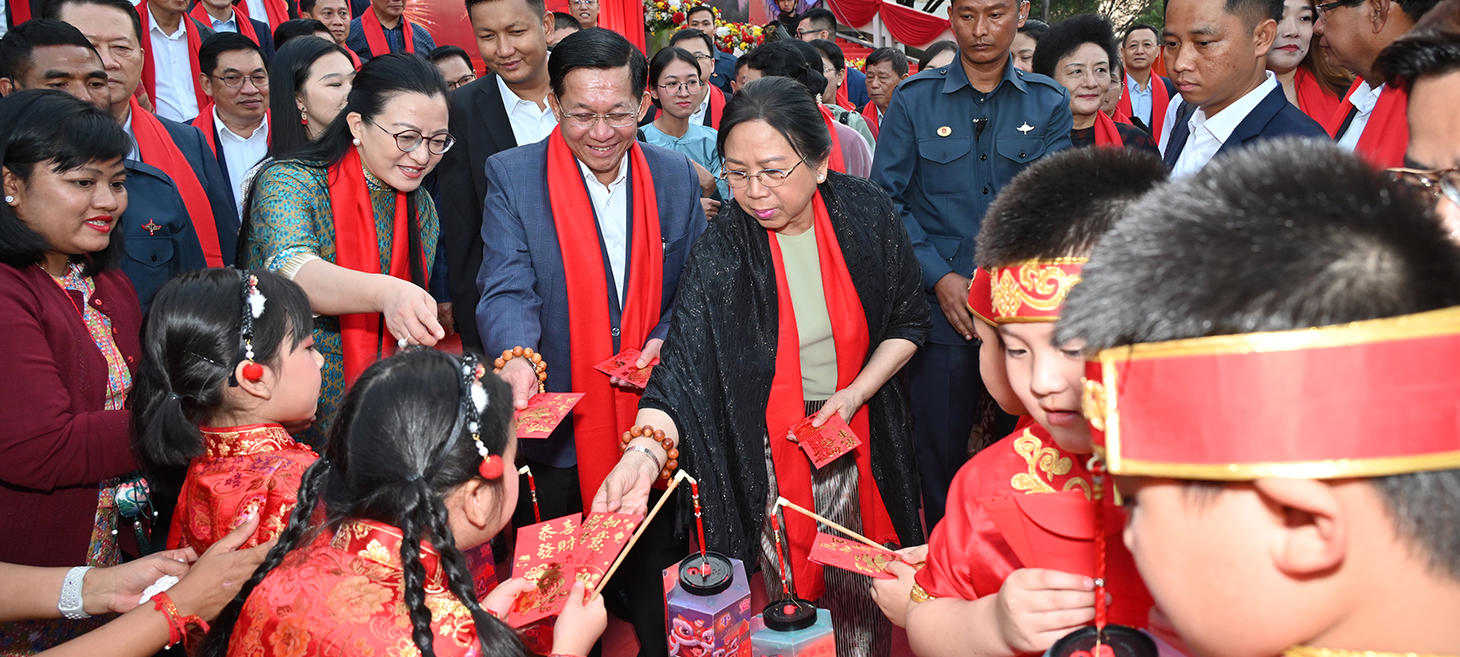
Myanmar Junta Boss Hails Beijing’s Tightening Embrace at Chinese New Year
Myanmar's junta chief, Min Aung Hlaing, has been strengthening ties with China, particularly since August of 2024. This was highlighted during Chinese New Year celebrations in Yangon, where Min Aung Hlaing expressed appreciation for Beijing's support. He promised to accelerate China's mega-projects in Myanmar and emphasized that attempts to harm Myanmar-China relations would not succeed. Notably, Chinese New Year was marked as a public holiday for the first time in Myanmar in recognition of Beijing's friendship. Min Aung Hlaing referred to China as an "eternal good neighbor" and a "good friend of Myanmar," while also calling Myanmar a "trustworthy friend and neighbor" of China. This contrasts with his earlier accusations that China was aiding ethnic forces in 2023. China has shown its support for the junta by sending its foreign minister to Naypyitaw and hosting Min Aung Hlaing in November. The junta is also working with China on projects such as the Myanmar-China Economic Corridor.
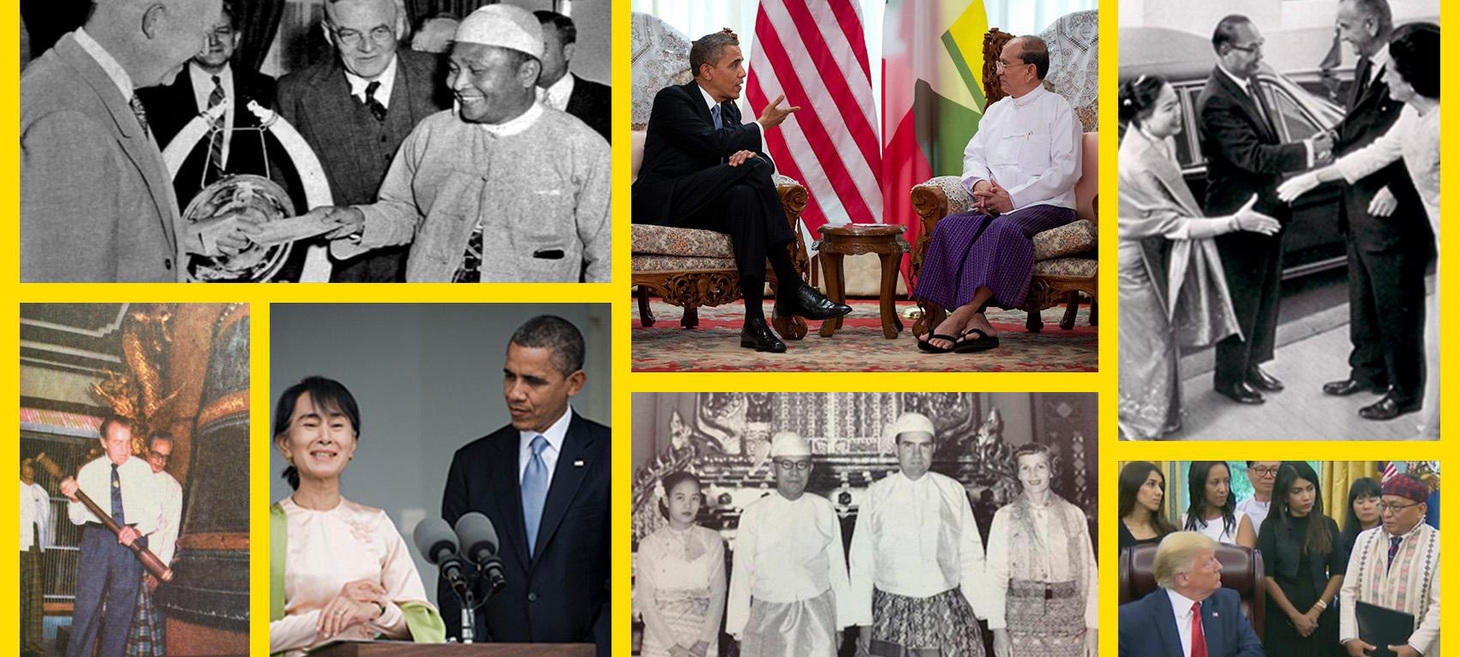
Staunch US Support for Democracy in Myanmar Feels Like a Distant Memory
The United States and Myanmar have had a long and complex relationship, with the US often supporting Myanmar's democracy movement, especially after the 1988 uprising. There have been many high-level visits between the two countries, including those of Vice President Richard Nixon, Secretary of State John Foster Dulles, and Prime Minister U Nu. In 1966, President Lyndon B. Johnson invited Myanmar's military dictator Ne Win to the White House. After 1988, the US backed the pro-democracy movement, and the name of pro-democracy leader Daw Aung San Suu Kyi was frequently mentioned in the Congressional Record. President Barack Obama made an historic trip to Myanmar in 2012 and supported the country’s democratic transition in 2015. However, the US response to the 2021 coup has been viewed as passive by many in Myanmar, with the US allowing ASEAN to take the lead. The return of Donald Trump to the White House raises questions about the future of the relationship, especially since he has previously imposed sanctions on Myanmar military leaders. The people of Myanmar are not optimistic that the change of administration will bring about any changes in US policy towards their country.
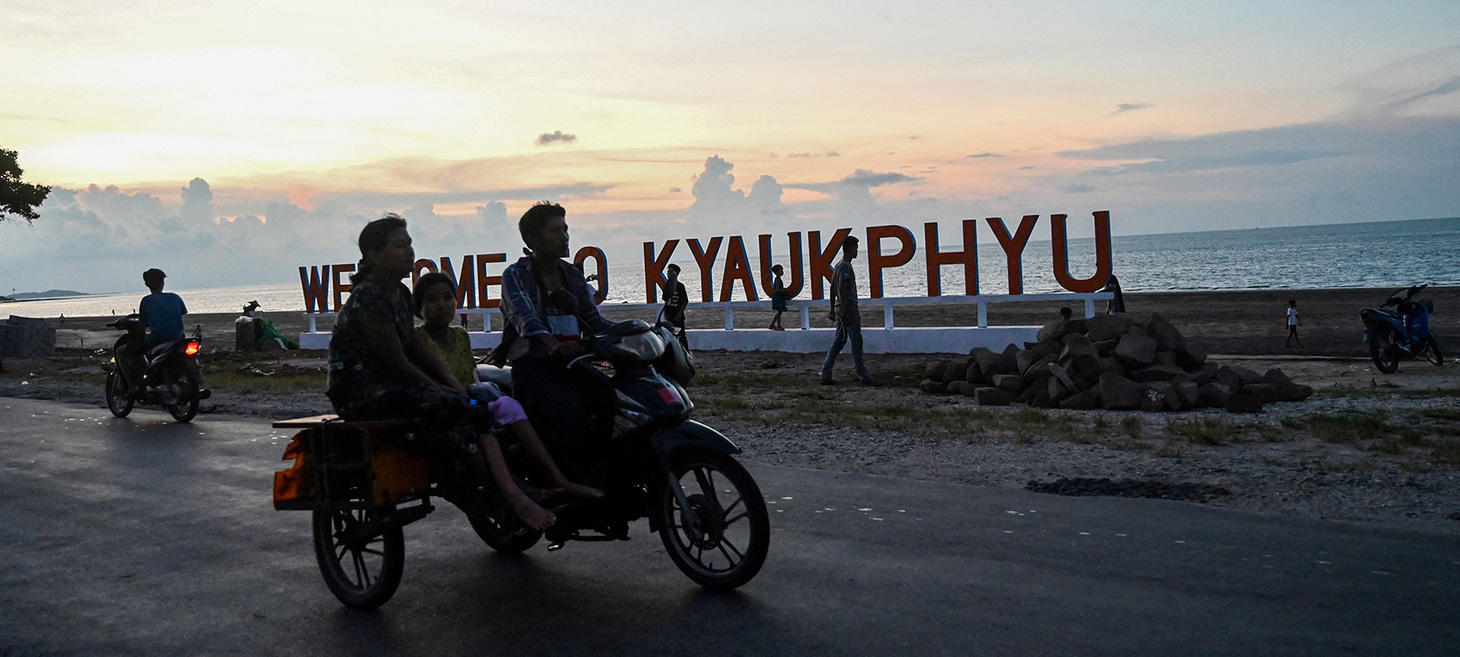
Myanmar Junta Puts on Show of Expediting China’s Rakhine Projects
Meetings have recently occurred between Myanmar's military regime and Chinese officials to discuss the implementation of the Kyaukphyu Special Economic Zone (SEZ) and deep-sea port projects in Rakhine State. These projects are key to the China-Myanmar Economic Corridor (CMEC), a part of China’s Belt and Road Initiative that aims to connect southwestern China to the Indian Ocean through Myanmar. The concession agreement for the port project was initially signed in 2020, with an addendum signed in 2023, extending the completion date to June 2025, but the regime is aiming to complete the projects two months ahead of the deadline. However, the Arakan Army has captured a significant portion of Rakhine State, including areas surrounding Kyaukphyu, which may impede the project's progress despite the regime's attempts to show progress to please China. Additionally, the junta needs China’s support, particularly after losing control of key border trade routes with China following an offensive by the Brotherhood Alliance in northern Shan State.

China’s Current Stance On Myanmar
China's stance on Myanmar is complex and appears to be driven by its own strategic and economic interests. China is concerned about the Myanmar military's (SAC) ability to manage the country, secure economic interests, and facilitate relations between the two nations. China has held talks with both the SAC and various resistance groups, including the MNDAA and TNLA. Despite these talks, no meaningful agreements have been reached, with the MNDAA refusing to leave territories it has recently gained. China seems to be shifting towards engaging with resistance groups that control regions where Chinese businesses operate, due to the ineffectiveness of the SAC. However, it is crucial for the resistance groups to remember that China's alliances are not permanent; if the SAC were to regain control, China would likely align with them again. Currently, many business projects in Myanmar, including those involving oil and gas, are under the control of various resistance groups.
General News

Four years after the coup, Myanmar remains on the brink - UN News
Myanmar is experiencing a severe polycrisis characterized by a complex interplay of economic, political, and social factors. The economy has sharply declined since 2021, with a 9% GDP contraction since 2020. This decline is exacerbated by high inflation, which reached 25.4% in 2024, and trade deficits, alongside currency devaluation. Illicit economies are thriving, with Myanmar becoming a major producer of opium, heroin, and methamphetamines, while the unregulated jade industry fuels corruption. Ongoing conflict has displaced millions and disrupted essential services, with over half the country lacking access to electricity and many hospitals out of service. Food insecurity is also a significant issue with agricultural productivity down 16% since 2021, and rice prices increasing dramatically. The dire conditions have caused a mass exodus of youth, with many facing exploitation and forced labor. School enrollment has declined, and the country has been blacklisted by the Financial Action Task Force for failing to combat money laundering. Overall, Myanmar faces a critical situation with no immediate political resolution in sight, and the crisis is projected to worsen in the coming year.
Healthcare
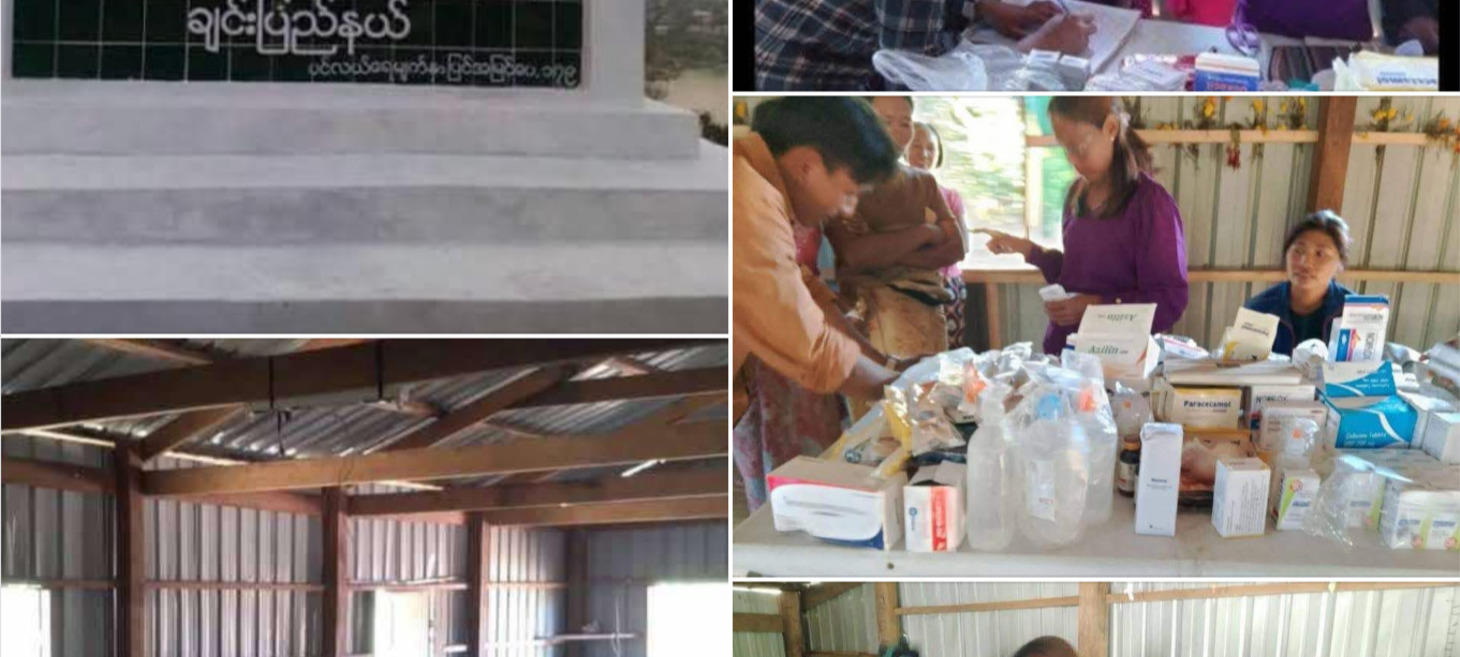
CHO Mobile Clinics Operating in Paletwa Township
The Chin Health Organisation (CHO), established by doctors and nurses who joined the anti-coup Civil Disobedience Movement, operates mobile health clinics in Paletwa Township, Chin State, with support from the Paletwa Council. These clinics provide malaria testing and medication, cholera vaccinations, and other healthcare services. Currently, the mobile clinics only operate in areas administered by the Paletwa Council around Samee Town due to limited resources, while the rest of the township is under the control of the Arakan Army (AA). Although the Paletwa Council and the AA have an informal agreement for healthcare support, the CHO does not currently have the resources to provide services in AA controlled areas. The township is in need of improved healthcare services due to fighting, its remote location and a shortage of medicine and health workers, with approximately 15,000 displaced people sheltering there. More resources are needed to expand the CHO's services to the entire Paletwa Township. The Paletwa Council was formed by the Paletwa Chinland Defence Force (CDF) and the Interim Khumi Affairs Coordination Council (IKACC).
Humanitarian
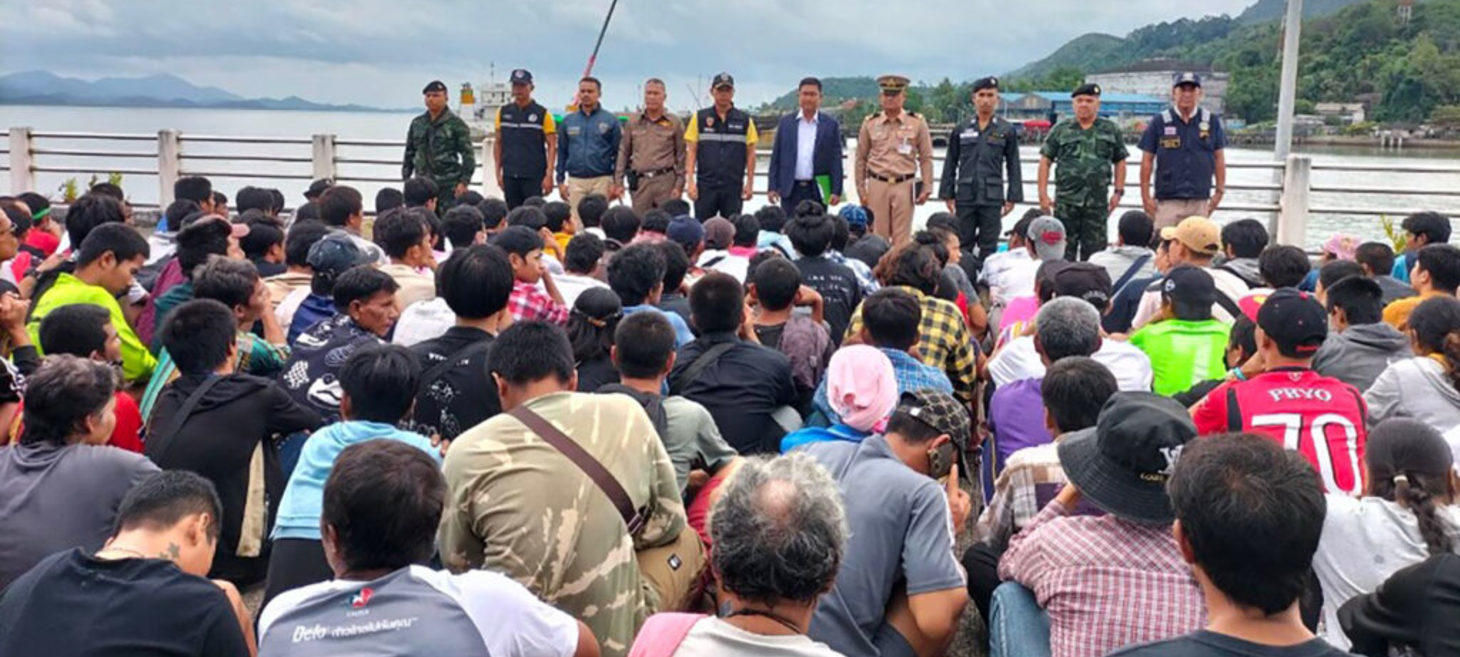
Thai Immigration Officials Feed Myanmar Deportees Into Junta’s War Machine
Thai immigration officials are deporting Myanmar nationals to the Myanmar junta, where they are often forced into military service. The Ranong Immigration Detention Center in Thailand has become a hub for the Myanmar junta to recruit detainees. Many of those deported are men between the ages of 18 and 45. The Myanmar junta is facing severe troop shortages, due to battlefield defeats, and has activated a forced conscription law. Myanmar authorities visit the Ranong center to select men for conscription. After deportation to Kawthaung, Myanmar, many are taken to Infantry Battalion Headquarters 262, where they are told they will have a "health checkup". Instead, they are forced into military service. Some individuals are able to avoid conscription by paying large bribes, but that is no longer an option for most. Some deportees have attempted to escape their conscription.
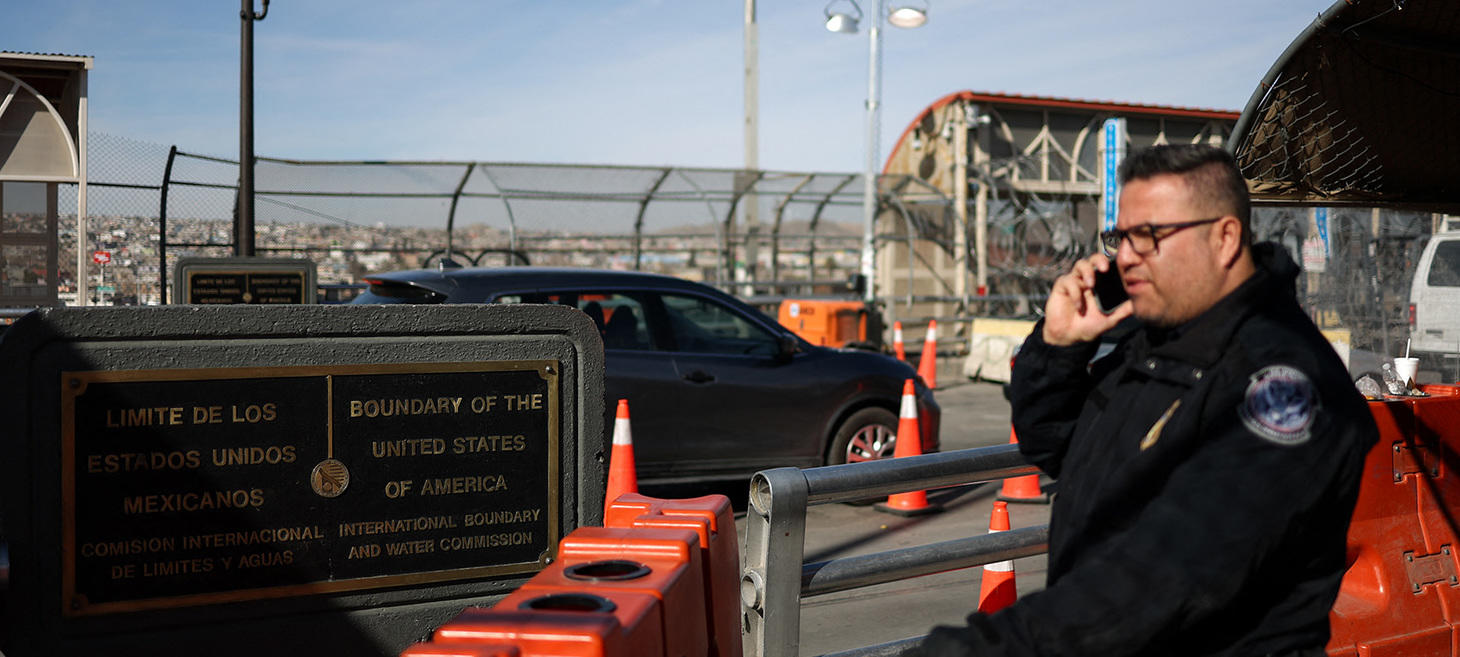
Trump Halts Refugee Arrivals in Crackdown
President Trump has halted refugee arrivals to the United States, implementing a sweeping crackdown on migration. This action cancels previously scheduled travel for refugees and suspends all processing of cases. The executive order signed by Trump suspends refugee admissions as of January 27, and orders a report on how to change the program, including giving more involvement to states and local jurisdictions. Refugees already resettled in the U.S. will continue to receive planned services. The move also revokes Biden's consideration of climate change in refugee admissions. The State Department will no longer undertake activities that facilitate or encourage mass migration, prioritizing border security and repatriation. While some programs like the Afghan resettlement program may continue, there are concerns that Afghans will also be left in limbo. The UN estimates that there are 37.9 million refugees in the world among some 122.6 million displaced people. The decision has been called "devastating" to refugees and criticized for going against core American values.
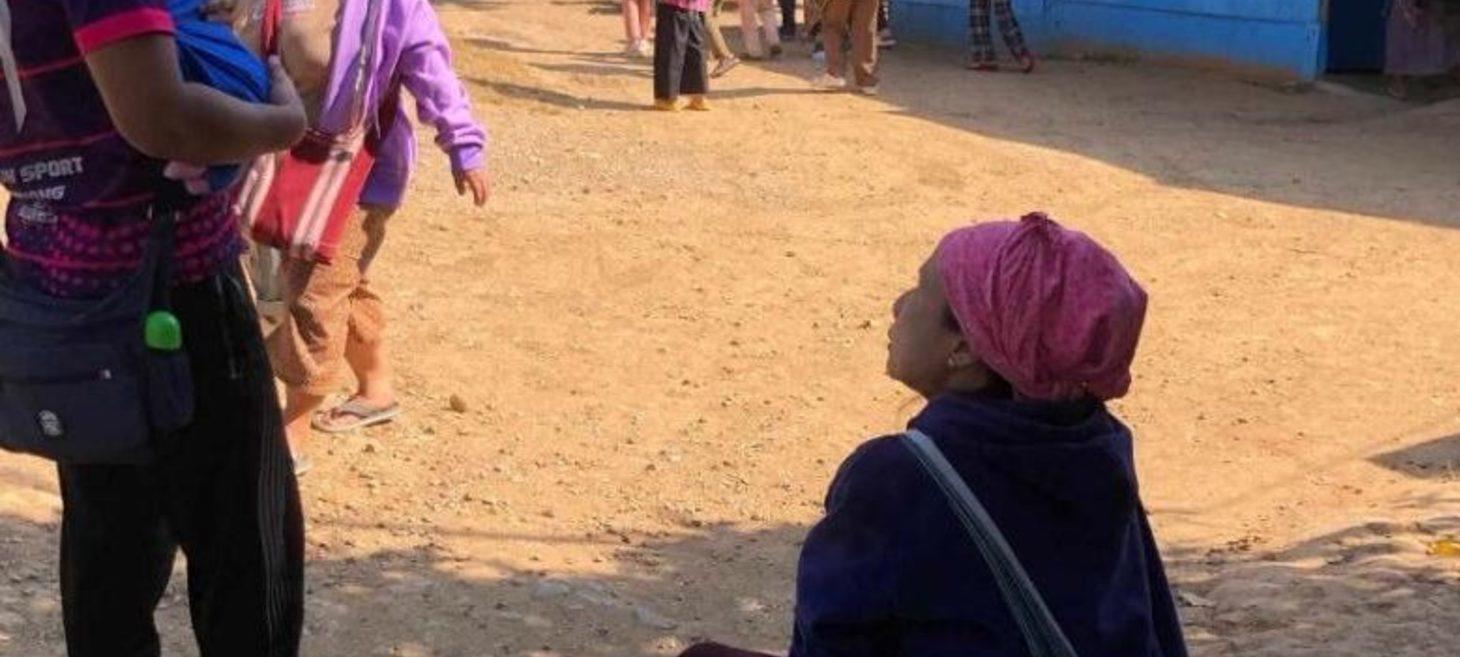
Trump Funding Pause Severely Disrupts Aid to Border Areas
President Trump's order to halt US funding for international development programs has led to the suspension of US government-funded humanitarian operations along the Thailand-Myanmar border. Many organizations providing education, healthcare, and aid to Myanmar refugees have been forced to suspend operations. The International Rescue Committee (IRC), a major funder of healthcare services in the region, suspended its operations, resulting in hospitals in border refugee camps discharging patients. The pause in aid has also affected organizations providing services to migrant workers and those offering cross-border healthcare and emergency assistance within Myanmar. The Committee for Internally Displaced Karen People (CIDKP) had to suspend all four of its primary operations. Additionally, the aid pause has affected independent Myanmar media operations. The US is the world’s largest international aid donor, having spent 68 billion USD in 2023. A similar aid suspension during Trump’s first term had major repercussions in the same region.